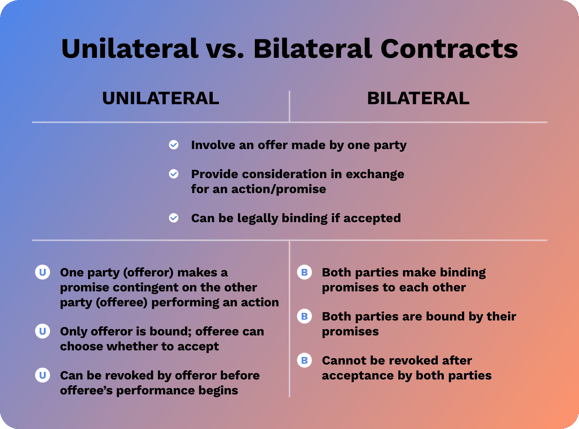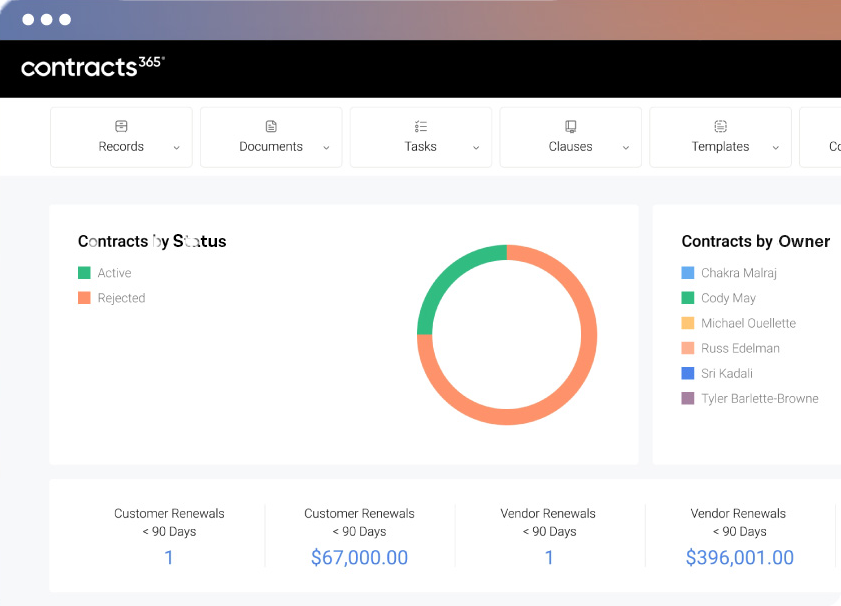Understanding Unilateral and Bilateral Contracts for Effective Contract Management
5 min read
Jessica Alden
Contracts are the backbone of business transactions, defining the agreements that businesses make with customers, employees, vendors, partners, and others. Businesses rely on two main types of contracts—unilateral and bilateral. Understanding these two distinct contract types is essential for anyone who must navigate the complex landscape of business and legal agreements. In this blog post, we’ll explore the key characteristics and common uses of unilateral and bilateral contracts to help you make informed decisions about your contract management processes.
In general, binding contracts involve three main aspects:
- An offer—a promise by the offeror to take a specified action
- Consideration—something of value promised by the offeror in exchange for a desired action by the offeree
- Acceptance—the agreement of the offeree to accept the terms of the offer
These elements operate slightly differently in unilateral contracts than they do in bilateral contracts.
What is a Unilateral Contract?
Unilateral contracts involve a promise made by one party (the offeror) to be fulfilled if and when an offeree performs the requested action. The offer may be made to one person or to many. In unilateral agreements, the contract is binding only on the offeror, and offerees have no obligation to act. An offeree may accept the offer by performing the action requested in the unilateral contract. Once the action is performed, the offeror is legally obligated to provide the consideration promised.
Example of a Unilateral Contract
For example, imagine your company promotes a contest asking its social media followers to post pictures of themselves using your product and promises a reward for the winning post. No one is obligated to post such a picture, but your company is obligated to follow the advertised terms of the contest and award the promised prize using the selection procedure described in the offer.
In unilateral contracts, performance by the offeree is construed as acceptance of the terms of the agreement. When an offeree relies on the offer in performing the requested action, the offeror becomes bound by its own contract terms. Failure to meet those terms amounts to breach of the unilateral contract.
What is a Bilateral Contract?
A bilateral contract, on the other hand, involves promises from both parties and obliges each to perform the promised actions. This is what typically comes to mind when people think of a contract: a promise in exchange for a promise. An example of this can be seen managing multiple suppliers.
Example of a Bilateral Contract
For example, a contract to procure goods from a supplier involves obligations on both sides: the supplier r must supply the goods as described, and the buyer must pay the specified price in exchange for those goods. When a buyer signs the sales contract, this indicates acceptance of the offered goods and a promise to pay the consideration it describes.
If either party fails to meet the obligations described in a bilateral contract, the other can sue for breach of contract.

Can Unilateral or Bilateral Contracts be Revoked?
Once created and accepted, a contract is generally considered irrevocable unless it explicitly states that it can be revoked in specific circumstances. What constitutes acceptance of an offer depends on the type of contract involved.
Revocability of Bilateral Contracts
In the case of a bilateral contract, the offeror can revoke it before it’s signed or otherwise accepted by the offeree. Contracts do not need to be in writing to be valid, so acceptance communicated over the phone, email, or in person can preclude the revocation of an offer.
For example, if a business submits a proposal in response to an RFP, acceptance of the proposal by the business could convert the proposal into a legally binding contract. For this to occur, the proposal must contain all the elements of a contract: an offer, consideration, and acceptance.
When drafting proposals, it’s important to understand whether you’re creating a contractual offer. If you don’t intend to be bound to the proposal, be sure to include language that makes this clear.
Revocability of Unilateral Contracts
An offeror must deliver the consideration promised in a unilateral contract once an offeree performs the action the contract requests. However, the offeror may revoke a unilateral contract at any time before an offeree accepts by performing or beginning to perform that action. The type of offer will determine how much action on the part of the offeree constitutes acceptance, precluding revocation by the offeror. In this way, the law differentiates between reward-type and performance-type contracts.
For example, if your neighbor advertises a reward for the return of their lost dog and then the dog comes home, they can revoke that offer, even if you’ve already spent time searching for the dog. On the other hand, if you’re a freelancer and a company offers $500 for the completion of a project, they may still be bound by that offer if it attempts to revoke it after you’ve begun work on the project.
The Importance of Effective Contract Management in Managing Unilateral and Bilateral Contracts
To foster good working relationships, maintain a positive brand image, and avoid unnecessary legal expenses, companies must ensure they abide by the terms of all their contracts, unilateral and bilateral alike. This involves not only keeping track of contractual obligations but also ensuring that contract language is aligned with the company’s intentions. As a company grows and develops a large number of contractual relationships, this can become increasingly difficult. From managing bilateral contracts when managing multiple suppliers to contract drafting, approval and execution, a robust contract management software can simplify and improve all aspects of the contract management process such as:
- Speed contract cycle time with automated workflows for review and approvals.
- Enhance collaboration with line of business integrations.
- Reduce the risk of unapproved or inconsistent contract language and other errors in the contracting process with pre-approved templates.
- Maintain version control so everyone can be sure they’re accessing the most up-to-date information available.
- Prevent contract breaches with alerts and notifications of missed obligations.
- Improve compliance with company policies, industry standards, and regulatory requirements.
Download the Tetra Technologies Case Study
Learn More
Contract Lifecycle Management Built for Microsoft 365
Contracts 365 is robust, contract management software that integrates seamlessly with Microsoft 365, using your company’s existing Microsoft 365 tenant as its repository. As a result, your company can take advantage of Microsoft’s industry-leading security infrastructure while providing employees access to the contract data they need, using the same apps and Azure Active Directory credentials they use every day.
Choosing a contract management system for your business requires careful research and consideration of your company’s needs both now and in the future. Ensure that any solution you invest in can efficiently scale to meet its evolving needs. To learn more about how Contracts 365 supports businesses like yours, examine our case studies or request a demo.
Subscribe and receive our latest blog articles in your work email.
We value your privacy. By subscribing, you agree to receive our newsletter. We’ll protect your personal data and use your email only for sending useful information. You can unsubscribe anytime. For details on data handling, please see our privacy policy.
Ready to Learn More?
Optimize your team’s contract lifecycle management with Contracts 365®
